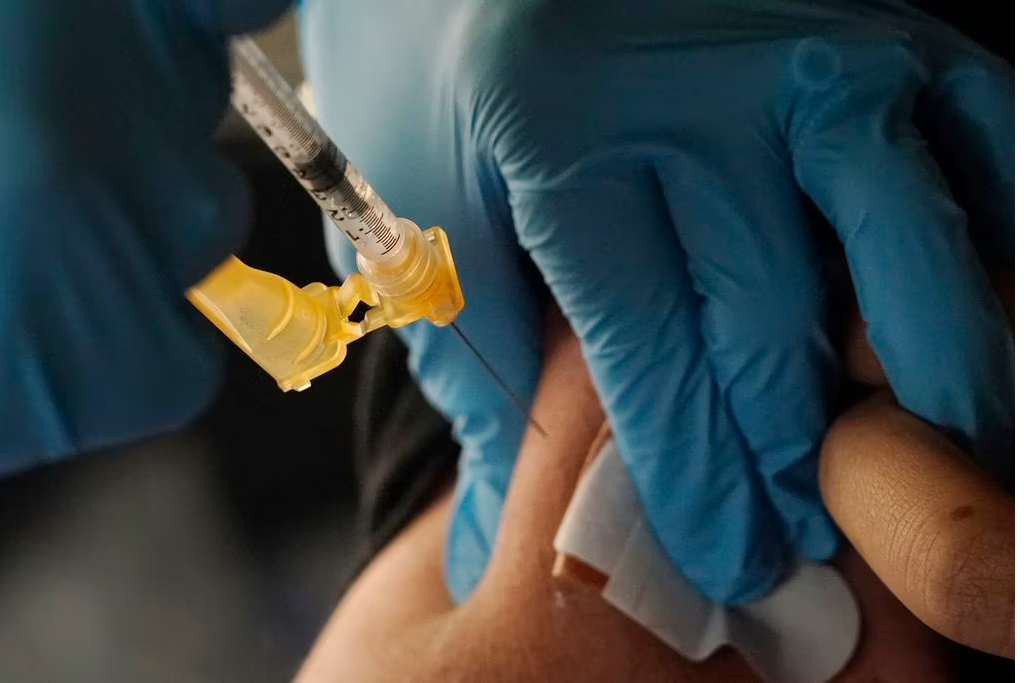The FDA has approved COVID booster shot.ROGELIO V. SOLIS/ASSOCIATED PRESS
By Travis Andersen Globe Staff,Updated April 19, 2023, 6:35 p.m.
The CDC on Wednesday approved another bivalent COVID-19 booster dose for older adults and people with weak immune systems in an effort to bolster protection against the virus this spring. The FDA approved the shot on Tuesday.
So who will be eligible for another shot?
In a statement, the FDA said it had amended the emergency use authorizations of the Moderna and Pfizer-BioNTech COVID-19 bivalent mRNA vaccines, introduced last year to target the Omicron variant of the virus,“ to be used for all doses administered to individuals 6 months of age and older, including for an additional dose or doses for certain populations.”
Here’s a breakdown of the various groups eligible for another bivalent booster.
Older Americans — People ages 65 and older who have received a single dose of the bivalent vaccine are now eligible to get another one at least four months after their initial shot, the FDA said.
Immunocompromised Americans — Most people who are immunocompromised will be eligible to receive an additional dose of the bivalent vaccine at least two monthsafter the first, according to the FDA.
The agency said that “additional doses may be administered at the discretion of, and at intervals determined by, their healthcare provider.” For children ages 6 months through 4 years old who have a weakened immune system, eligibility “will depend on the vaccine previously received.”
Unvaccinated children — According to the FDA, unvaccinated children ages 6 months through 5 years old have a couple of options. They can now get the two-dose series of the Moderna bivalent vaccine through age 5 or the three-dose series of the Pfizer-BioNTech bivalent vaccine through age 4. Children who are 5 may receive a single dose of the Pfizer vaccine.
Vaccinated children — The FDA said those ages 6 months through 5 years old who have received as many as three doses of the monovalent vaccine can now receive a bivalent booster, but the number of doses will “depend on the vaccine and their vaccination history.”
Remainder of unvaccinated population — Most unvaccinated people may now receive “a single dose of a bivalent vaccine,” instead of multiple doses of the original COVID-19 vaccines that have been phased out.
Remainder of vaccinated population — While people who have not gotten a bivalent booster can continue to do so, most people who have already gotten the shot are not eligible for a second. The FDA said it intends to make decisions about future vaccination after receiving recommendations on the fall strain composition in June.
“The agency believes that this approach will help encourage future vaccination,” Peter Marks, director of the FDA’s Center for Biologics Evaluation and Research, said in a statement. “Evidence is now available that most of the US population 5 years of age and older has antibodies to SARS-CoV-2, the virus that causes COVID-19, either from vaccination or infection that can serve as a foundation for the protection provided by the bivalent vaccines. COVID-19 continues to be a very real risk for many people, and we encourage individuals to consider staying current with vaccination, including with a bivalent COVID-19 vaccine. The available data continue to demonstrate that vaccines prevent the most serious outcomes of COVID-19, which are severe illness, hospitalization, and death.”
In Massachusetts, there have been more than 2 million COVID-19 cases since the start of the pandemic, including 22,562 deaths, according to Department of Public Health statistics.
According to the DPH, 85 percent of the state population, or 5.9 million people, have completed a “primary series of vaccine,” while roughly 29 percent, or 2 million residents, have received a booster since September 2022.
The new FDA authorizations were hailed by Dr. Peter Hotez, a vaccine scientist at the Baylor College of Medicine in Houston.
“FINALLY,” Hotez tweeted.
FINALLY: FDA Authorizes Changes to Simplify Use of Bivalent mRNA COVID-19 Vaccines | FDA. https://t.co/N4gVpLgPlC
— Prof Peter Hotez MD PhD (@PeterHotez) April 18, 2023
Dr. Elizabeth T. Jacobs, an epidemiology professor at the Mel and Enid Zuckerman College of Public Health and the University of Arizona Cancer Center, noted that the FDA had revised its guidelines language in its new recommendations.
Jacobs wrote that there’s “updated language in here that appears to allow for healthcare providers more latitude when recommending boosters for the immunocompromised; it’s possible that they may be available at regular intervals for those at highest risk.”
The FDA has just approved a *second bivalent booster* for people aged 65 and up, as well as for the immunocompromised! For 65+, you may get another bivalent booster 4 months after the last; for immunocompromised, it’s 2 months. https://t.co/Y3ayy8dO40
— Elizabeth Jacobs, PhD 🏴☠️ (@TheAngryEpi) April 18, 2023
Material from the Associated Press was used in this report.
Travis Andersen can be reached at travis.andersen@globe.com.


